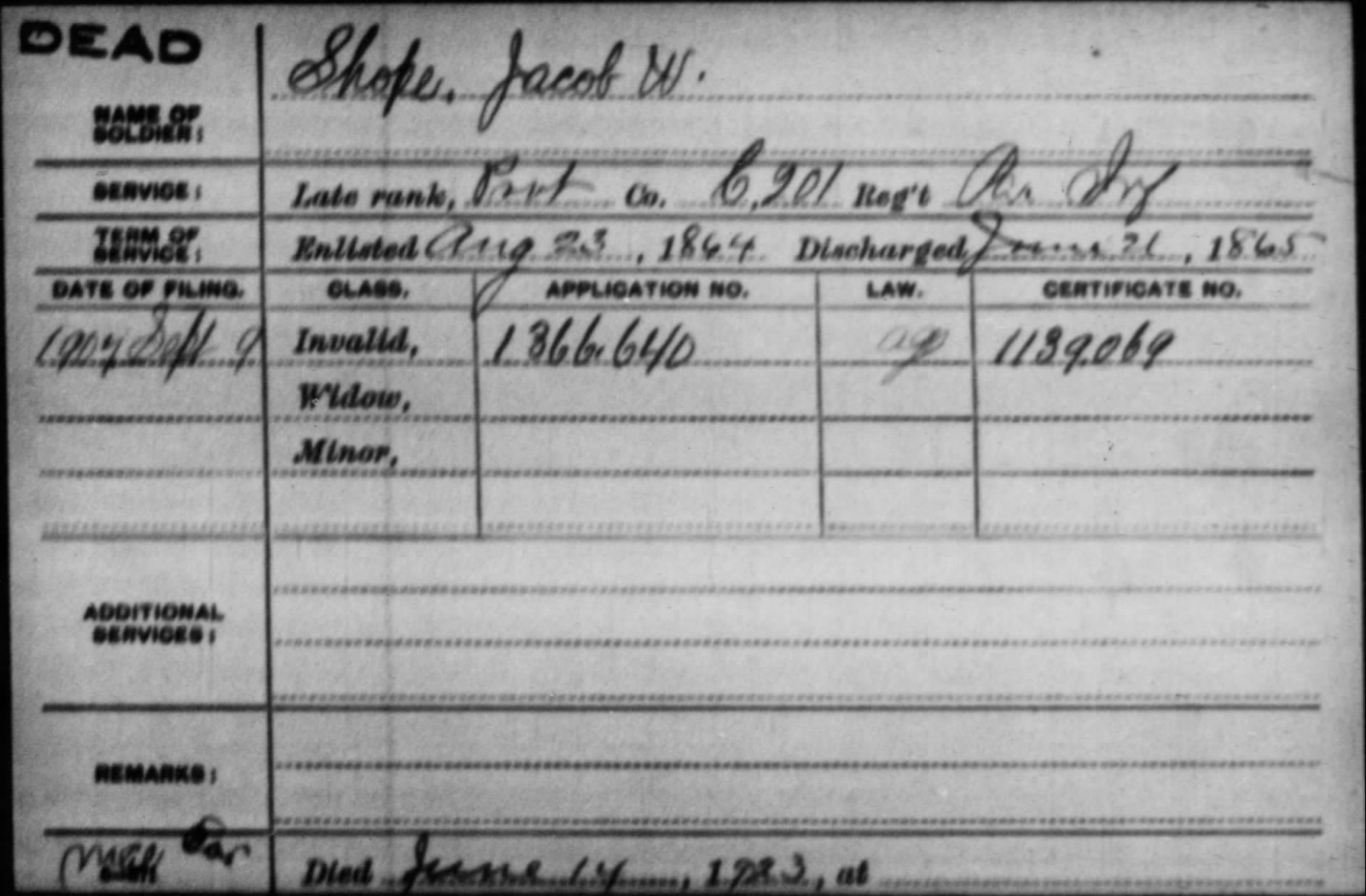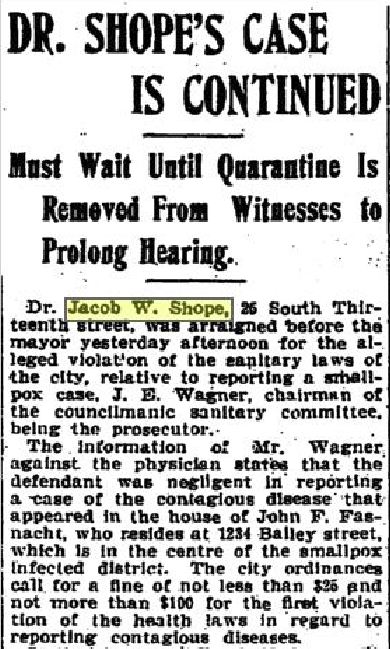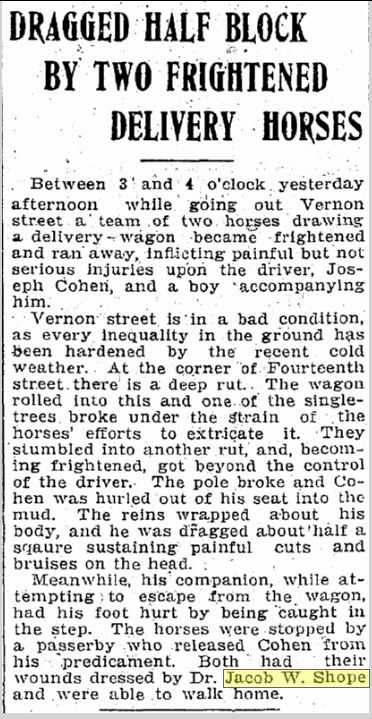Dr. Jacob W. Shope – Physician of Halifax and Harrisburg
Posted By Norman Gasbarro on February 3, 2013
Jacob W. Shope (1845-1923) was a physician in Halifax, Dauphin County, Pennsylvania, who served in the 201st Pennsylvania Infantry, Company C, as a Private, during the Civil War.
The Pension Index Card shown above is from Fold3 and gives the death date of Dr. Shope as 14 June 1923. He is buried in the Paxtang Cemetery, Paxtang, Dauphin County.
Who was Jacob W. Shope? A biographical sketch that appeared in the the Commemorative Biographical Encyclopedia of Dauphin County tells a great amount about him:
Jacob W. Shope, physician and surgeon, Halifax, Dauphin County, Pennsylvania, was born in Linglestown, Dauphin County, 22 August 1845. He is a son of John Shope and Mary [Mason] Shope. John Shope was born in Linglestown in 1815. From the date of his marriage, he was a resident of Linglestown and was engaged in the butcher business. In 1864 he removed to Dauphin, Pennsylvania, where he now resides. Mrs. John Shope, who was born in Lancaster County, Pennsylvania, in 1816, died 17 January 1885, in the borough of Dauphin. They had nine children: an infant that died; David Shope, who died from the effects of a fall; Harriet Shope, wife of P. D. Felty; Elizabeth Shope, wife of A. T. Gerberich; Dr. Jacob W. Shope; William Shope; George Shope; John Shope; and Mary Shope, wife of W. Manley, residing at Rockville, Dauphin County.
Jacob W. Shope spent his boyhood in his native town. After leaving the public schools, in which he was educated, he was for one year a clerk in a dry goods store. He then learned the trade of shoemaking, at which he worked for some time. On 22 August 1864, Mr. Shope enlisted in Company C, Two Hundred and First Regiment Pennsylvania Volunteers [201st Pennsylvania Infantry], and served until the close of the war, being mustered out at Harrisburg. He then carried on the retail shoe business at Dauphin, Pennsylvania, for two years. This business he sold out in 1867, and was for several years engaged in bridge building. Again he took up the shoe business in Dauphin and carried it on until 1876. In this year, Mr. Shope began the study of medicine. In the fall of 1878, he entered Jefferson Medical College, Philadelphia, Pennsylvania, and was graduated in March 1880. Since that date he has been a continuous resident of Halifax and a successful practitioner in his profession.
Dr. Shope was married in Halifax, 7 January 1870 to Margaretta J. Shope, daughter of John Shope and Elizabeth [Oswald] Shope. They have three children: Charles R. Shope, editor of the Halifax Gazette; Minnie O. Shope, and Susan E. Shope. Dr. Shope is an active worker in the Republican Party. He has been a member of the school board and its president. He and his family attend the Methodist Episcopal Church.
An additional biographical sketch was found in the History of Dauphin County:
SHOPE FAMILY. Among the representative of this well-known Dauphin county family are Dr. Jacob W. Shope and his son Charles Reed Shope of Halifax. The former is a son of John Shope, who was born in 1815, in Linglestown, Dauphin county, where he was engaged in business as a butcher until 1864, when he moved to Dauphin County. Mr. Shope married Mary Mason, born in 1816 in Lancaster county, Pennsylvania, daughter of John Mason, a surgeon in the Swiss army, and they had nine children: David Shope; Harriet Shope, wife of P.D. Felty; Elizabeth Shope, wife of A. T. Gerberich; Jacob W. Shope, of whom later; William Shope, George Shope, John Shope, Mary Shope, wife of W. Manley; and one who died in infancy. Mrs. Shope died 17 Jul 1885 in the Borough of Dauphin.
Jacob W. Shope, son of John Shope and Mary [Mason] Shope, was born 22 Aug 1845, in Linglestown, where he received his education in the public schools. He then served for one year as a clerk in a dry goods store, after which he learned the trade of shoemaking, at which he worked for some time. On 22 Aug 1864, he enlisted on Company C, Two Hundred and First Regiment, Pennsylvania Volunteers, and served until the close of the war, being mustered out at Harrisburg. After his return home he was for two years engaged in the retail shoe business at Dauphin, selling out in 1867, and for several years giving his attention to bridge building, after which he again for a time carried on the shoe business at Dauphin. In 1876 he began the study of medicine, and in the autumn of 1878 entered Jefferson Medical College, Philadelphia, whence he graduated in March 1880. Since that time he has continuously practiced his profession in Hailfax. He has been a member of the school board and has served as its president. He affiliates with Susquehanna Lodge, No. 364, F. and A. M., of Millersburg, and is an active worker in the Republican Party. He and his family attend the Methodist Episcopal Church.
Dr. Shope married, 7 Jan 1870, in Halifax, Margaretta J. Oswald, daughter of John Oswald and Elizabeth Oswald, of Mifflin County, Pennsylvania, and they have three children: Charles Reed Shope…; Minnie O. Shope, and Susan E Shope., wife of Howard Frey of Harrisburg.
The Civil War service of Dr. Shope can best be described in the following passage from the Union Army, Volume I, found on Ancestry.com.
The 201st Pennsylvania Infantry Regiment, principally from Dauphin County, was mustered into the service at Camp Curtin, Harrisburg, 18 to 19 August 1864, for one year. It was the first ready for duty of the ten regiments furnished by the state under the president’s call of 18 July 1864, for 500,000 men, been recruited to the maximum strength in less than 30 days. All the field officers had served in the 127th regiment and many of the line officers and men had been in the service before. Immediately after its organization it proceeded to Chambersburg, where it was schooled and drilled for a short period. On 17 September, Company H was detailed for special duty at the general hospital in York; Company F and Company G were ordered to Bloody Run, where they reported to Gen. Ferry, commanding the Juniata District; a little later Company F was sent to McConnellsburg, where it was employed during the fall and winter in arresting and forwarding deserters; Company E was detailed on 18 September, for provost duty at Scranton; the main body of the regiment performed guard duty on the Manassas Gap Railroad near Gainesville and Thoroughfare Gap until 13 November, and was then placed in Camp Slough, Alexandria, on guard duty. On 26 May 1865, it was ordered to Fort Delaware, where it remained until the close of its term. It was mustered out at Harrisburg on 21 June 1865.
Only one member of this regiment was killed or mortally wounded in combat, while fifteen died of disease or accident.
Although both published biographical sketches of Dr. Shope indicate that he was married in Halifax, an actual record from 5 January 1870 has been located at the Zion German Lutheran Church in Harrisburg that says he was married in Harrisburg (see above).
Another error occurs on the 1890 census, enumeration of surviving veterans and widows at Halifax, Dauphin County. Jacob W. Shope is reported to have served in the 210th Pennsylvania Infantry, not the 201st Pennsylvania Infantry in which he actually served. Since the dates of service are not given, it is probable that the information was supplied by someone other than Dr. Shope himself.
Dr. Shope is included in the list of Civil War veterans published in the Halifax Bicentennial Book in 1994. He is named as Dr. J. W. Shope.
By 1900, Dr. Shope had moved to Harrisburg and he appears there in the 1900 census. It is not known why he moved from Halifax.
Two interesting stories have emerged about Dr. Shope and his activities in Harrisburg.
The first story (above) appeared in the Harrisburg Patriot on 5 November 1904:
DR. SHOPE’S CASE IS CONTINUED
Must Wait Until Quarantine Is Removed From Witnesses to Pro Prolong Hearing
Dr. Jacob W. Shope… was arraigned before the mayor yesterday afternoon for the alleged violation of the sanitary laws of the city, relative to reporting a smallpox case. J. E. Wagner, chairman of the councilmatic sanitary committee, being the prosecutor.
The information of Mr. Wagner against the physician states that the defendant was negligent in reporting a case of the contagious disease that appeared in the house of John F. Fastnacht, who resides at 1234 Bailey Street, which is in the centre of the smallpox infected district. The city ordinances call for a fine not more than $100 for the first violation of the health laws in regard to reporting contagious diseases.
The long article then went on to explain that Dr. Shope had attended Fastnacht’s daughter twice and did not detect any symptoms of smallpox. Witnesses claimed that Dr. Shope had diagnosed the girl’s problem as “stomach trouble,” but another doctor, who visited the girl the day after one of Dr. Shope’s visits, claimed that he saw some scabs on her body, but that in the case of smallpox, it would take from 9 to 31 days for the telltale pustules of smallpox to appear. He supported Dr. Shope’s lack of reporting at the time, noting how difficult it would be to make an accurate diagnosis in the absence of scabs. Dr. Shope insisted that he had been told that the child had eaten six bananas which caused her “stomach trouble.” After Dr. Shope was told that another doctor had seen scabs, he [Dr. Shope] submitted the required postal card report, but indicated that the evidence of smallpox was “hearsay.” Nevertheless, quarantine was established by the local health officials. While the final outcome of the case was not reported, it is doubtful if anything more than a fine was given to Dr. Shope, if anything was done at all. It also seems that somehow politics was involved.
The second story involving Dr. Shope occurred on 24 March 1906 :
RAGGED HALF BLOCK BY TWO FRIGHTENED DELIVERY HORSES
Between 3 and 4 o’clock yesterday afternoon while going out on Vernon Street a team of two horses drawing a delivery wagon became frightened and ran away, infecting painful but not serious injuries upon the driver Joseph Cohen and a boy accompanying him.
Vernon Street is in a bad condition as every inequality in the ground has been hardened by the recent cold weather. At the corner of Fourteenth Street there is a deep rut. The wagon rolled into this and one of the single-trees broke under the strain of the horses to extricate it. They stumbled into another rut, and becoming frightened, got beyond the control of the driver. The pole broke and Cohen was hurled out of his seat into the mud. The reins wrapped about his body, and he was dragged about half a square sustaining painful cuts and bruises on the head.
Meanwhile, his companion, while attempting to escape from the wagon, had his foot hurt by being caught in the step. The horses were stopped by a passerby who released Cohen from his predicament. Both had their wounds dressed by Dr. Jacob W. Shope and were able to walk home.
From these two stories, it appears that it was the mayor and council who failed to perform their duties rather than the good doctor.
Other information is sought on Dr. Jacob W. Shope, his war service, his time in Halifax, and his family. Especially sought is a picture of Dr. Shope. Comments may be added to this blog post and information may be sent by e-mail to the Civil War Research Project.
—————————
News articles are from the on-line resources of the Free Library of Philadelphia. The Project File for Jacob W. Shope is CW#S163.
 ;
;







Comments